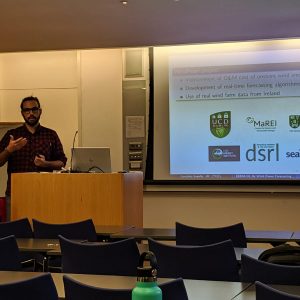
WindPearl

- Title
-
WindPearl: Robust Real-Time Wind Power Prediction And Early, Accurate Estimation Of Downtime For Irish Wind Farms In An Integrated Single Electricity Market
- Start Date
-
October, 2018
- End Date
-
February, 2022
- Funding Body
-
Sustainable Energy Authority of Ireland, SEAI.
- Coordinator
-
Vikram Pakrashi, UCD
- Research Partners
-
Trinity College Dublin
- Project Partners
-
UCD, TCD, WFSO
- Principle Investigators
-
Vikram Pakrashi (TCD)
- Project Manager
-
Juan González Sopeña
- Website
Introduction
Ongoing research towards improving the operations and maintenance cost of onshore wind energy, lowering the levelized cost of energy and reducing uncertainties and around power production through bespoke data-driven, real-time forecasting algorithms and feature-detecting analytics with the capability of handling data of variable qualities, power production variation and early downtime detection with high accuracy.
Therefore, the aims of the project are:
Wind power forecasting
In the last few years, wind power forecasting has established itself as an essential tool in the energy industry due to the increase of wind power production in the electric grid. The team’s present focus is on developing novel machine learning algorithms to effectively forecast wind power generation for short, medium, and long terms. Forecasting of the wind power generation may be considered at different time scales, depending on the intended application. From milliseconds up to a few minutes, forecasts can be used for the turbine active control. Such type of forecasts is usually referred to as very short-term forecasts. For the following 48–72 hours, forecasts are needed for power system management or energy trading. Bids for energy to be supplied on a day are usually required during the morning of the previous day. These forecasts are called short-term forecasts. For longer time scales (up to 5–7 days ahead), forecasts may be considered for planning the maintenance of wind farms, or conventional power plants or transmission lines. Maintenance of offshore wind farms may be particularly costly, so optimal planning of maintenance operations is of particular importance – another aspect that is presently investigated by the team.
Real-time downtime detection of wind turbines
Complex systems are susceptible to many types of anomalies, faults, and abnormal behavior caused by a variety of off-nominal conditions that may ultimately result in major failures or catastrophic events. Early and accurate detection of these anomalies using system inputs and outputs collected from sensors and smart devices has become a challenging problem and an active area of research in many application domains. A real-time downtime detection framework is actively pursued by the researchers to determine whether a sample is an anomalous event, taking into consideration the trade-off between misclassification errors and detection rates. The proposed detection model not only identifies the downtime but also classifies it as a scheduled maintenance break, a fault, or even as an outlier – in a real-time framework – that effectively translates to lower production, maintenance, and operational costs.
Work Packages
WP1 Development of methodologies for improved wind turbine downtime detection and power curve forecasts
WP2 Implementation of improved wind turbine downtime detection algorithms
WP3 Comprehensive benchmarking of developed algorithms
WP4 Implementation of improved wind turbine power curve forecasts
WP5 Project Management
Deliverables
WP1
WP1-D1 Final scientific report
WP1-D2 Handbook on industrial targets of performance measures
WP1-D3 Database of summary statistics
WP2
WP2-D1 Numerical repository
WP2-D2 Implementation of software
WP3
WP3-D1 Repository of benchmarked algorithms
WP3-D2 Guidelines and recommendations document.
WP3-D3 Report on understanding the value of information
WP4
WP4-D1 Creation of a numerical repository
WP4-D2 Development of guidelines
WP4-D3 Software implementation
WP5
WP5-D1 Final report
WP5-D2 Half-way report
WP5-D3 Communication Plan
Publications
Contact
Engagement and Outreach
Photo Gallery









